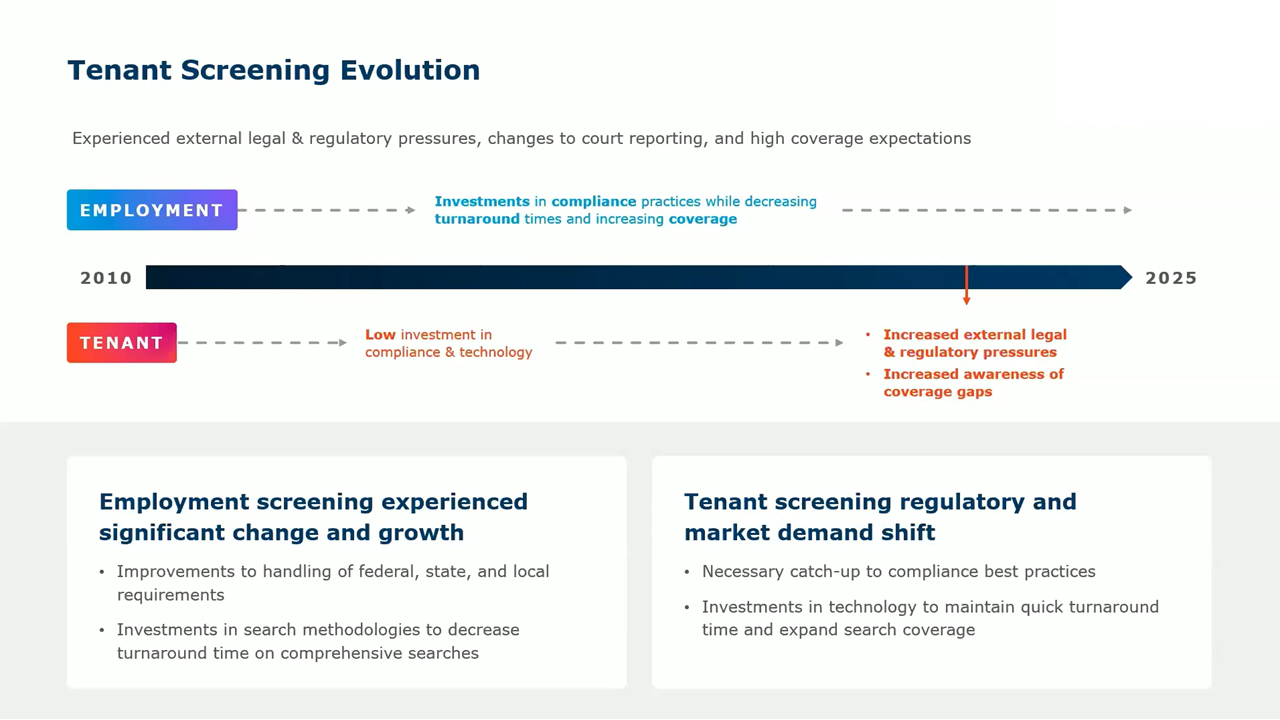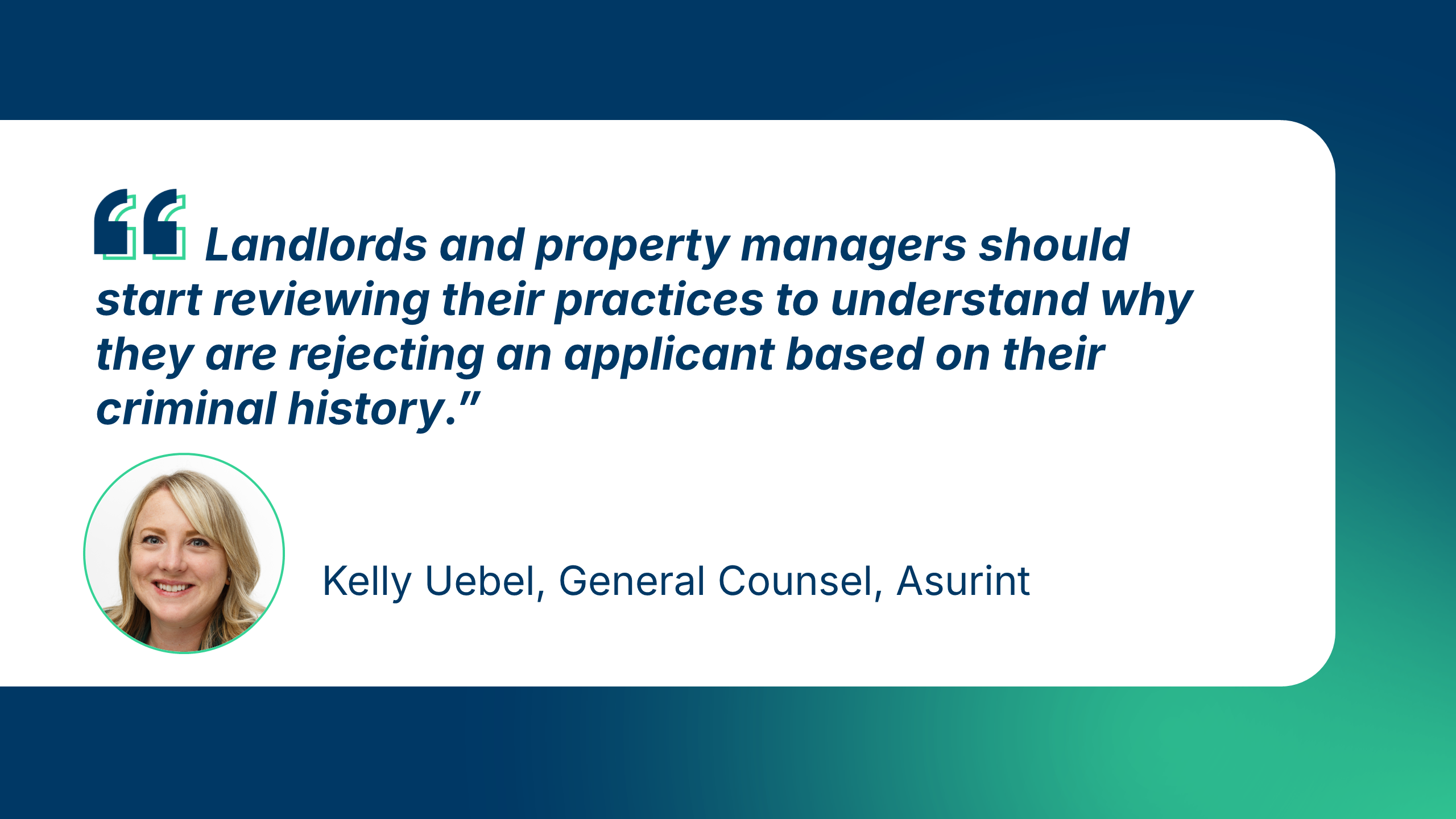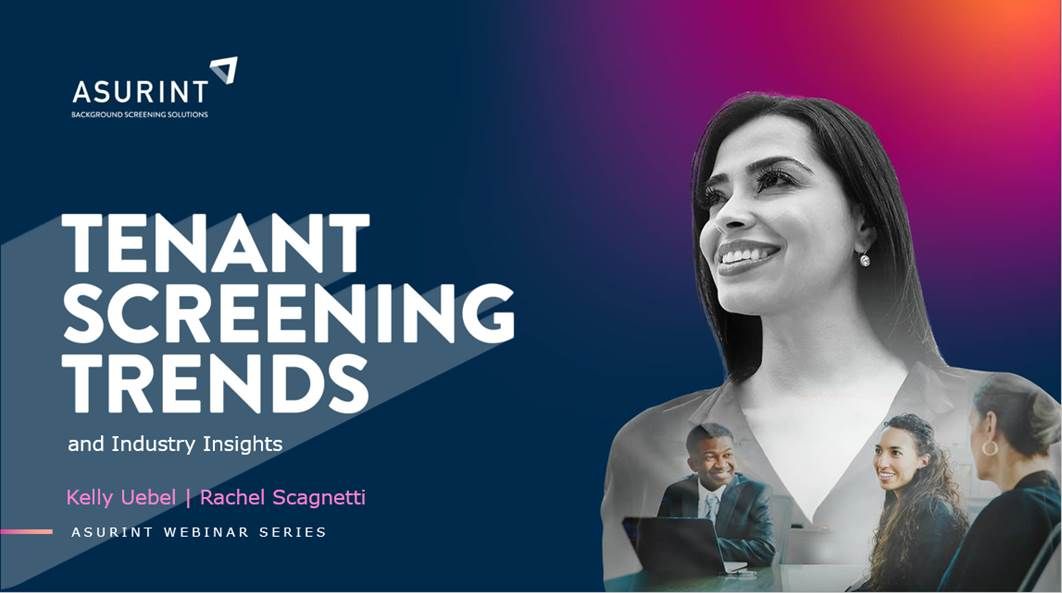Navigating the New Era of Tenant Screening: What Landlords Need to Know
6 min read
Published
Sep 26, 2025

With advancements in technology, growing market demands, and ongoing regulatory updates, tenant screening is quickly evolving. With over 45 million Americans renting homes, property managers must adapt to an ever-changing landscape to ensure they are selecting the very best tenants.
In a webinar hosted by Asurint, industry experts Kelly Uebel, General Counsel, and Rachel Scagnetti, Director, Product Management, alongside Stephen Buckley, Engineering Manager at Findigs, came together to discuss the evolving landscape of tenant screening and the importance of accuracy, coverage, and compliance in tenant background checks.
Watch the full webinar here.
Tenant Screening Evolution
So where exactly is the tenant screening industry at? It’s important to first understand the evolution in the employment space, because although in many ways they differ, they also mirror each other when it comes to the compliance pressures both are experiencing. Rachel explained, “Many years ago, employment screening began evolving in response to increasing legal and regulatory pressures specifically around compliance. These efforts were driven by the growing need to meet compliance standards and mitigate risks. Now, we’re seeing those same compliance-driven pressures shift into the tenant screening space.”

Rachel highlighted how Asurint has leveraged its experience in employment screening to innovate in ways that are unique to tenant screening: enhancing coverage, improving turnaround times, and ensuring compliance without sacrificing speed. “We’ve invested heavily in technology to make sure we’re not just meeting best practices, but setting them,” she said.
Legislative Trends in Tenant Screening
Kelly Uebel emphasized the complexity of staying compliant in a landscape where legislation is constantly evolving. “We’re seeing three major trends: reusable or portable tenant reports, fair chance housing laws, and eviction-related restrictions,” she noted.
Reusable or Portable Tenant Reports: These aim to simplify and speed up the rental application process by allowing tenant applicants to share background checks with multiple landlords. States such as Maryland, Illinois, and Colorado already have this legislation in place. Topics in these laws include report contents and freshness, consumer verifications, and impact to application/background check fee.
Fair Chance Housing Laws: These are perhaps the most disruptive in the tenant screening space. These laws limit the use of criminal history in tenant decisions, often requiring landlords to make conditional offers before accessing background information.
“This legislation is among the most difficult for tenant screeners as they evaluate if, and how, they may want to support property managers and landlords with their compliance,” Kelly said. “The legislation potentially narrows the scope of convictions that can be considered and introduces complex requirements around adverse action notices and individualized assessments.”
Eviction-related Legislation: Several states have considered legislation to seal or expunge eviction records or limit their use in tenant screening. Eviction records are receiving a greater microscope across several jurisdictions than they have in the past given the potential impact they can have on an individual’s eligibility for the property.
Litigation Risks: Accuracy and Discrimination in Focus
Litigation in tenant screening is on the rise, with two primary areas of concern: accuracy and discrimination.
“Not that big of a surprise, but maintaining accuracy is foundational,” Kelly stressed. “We’re seeing lawsuits over mismatched records, duplicate entries, and outdated or incomplete data. The Fair Credit Reporting Act requires maximum possible accuracy and failing to meet that standard can be costly.”
Discrimination claims are also increasing, particularly around racial bias and disparate impact. The webinar covered recent cases where screening algorithms were alleged to disproportionately harm housing voucher recipients or where blanket bans on criminal history led to racial discrimination. “The trend is clear,” she said. “Landlords and property managers should start reviewing their practices to understand why they are rejecting an applicant based on their criminal history.”
“Landlords and property managers should start reviewing their practices to understand why they are rejecting an applicant based on their criminal history.” Kelly Uebel, General Counsel, Asurint.

Best Practices for Choosing a Tenant Screening Partner
Given the complexity of compliance and litigation risks, choosing the right tenant screening partner is more critical than ever.
Here are some key questions to ask when looking for a tenant screening provider:
- How do you handle federal, state, and local compliance?
- Do you filter out records that landlords legally cannot consider?
- What is your coverage model, and how often is it updated?
- How do you ensure accurate record matching?
- What is your turnaround time, and how do you balance speed with thoroughness?
Transparency and flexibility are critical when vetting a tenant screening partner. At Asurint, we offer multiple package options and coverage options to meet different needs. Our goal is to increase coverage, reduce turnaround time, and provide only the information that’s relevant and legally usable.
Real-World Integration: Findigs’ Perspective
Stephen Buckley of Findigs shared his experience integrating Asurint’s tenant screening technology: “As an engineer, I dreaded the integration at first,” he admitted. “But Asurint was the most high-touch partner I’ve ever worked with. Their team was responsive, knowledgeable, and incredibly helpful.”
“As an engineer, I dreaded the integration at first. But Asurint was the most high-touch partner I’ve ever worked with. Their team was responsive, knowledgeable, and incredibly helpful.” Stephen Buckley, Engineering Manager, Findigs

Stephen praised Asurint’s ability to simplify compliance logic. “They made it easy for our compliance experts to set up rules for different jurisdictions. I didn’t have to worry about coding complex legal logic. Asurint handled it.”
He also highlighted Asurint’s speed and reliability. “Our first bug wasn’t even their fault. It was ours. Their reports came back so fast that they exposed a race condition in our system. That’s a good problem to have.”
Keeping Compliance at the Forefront
Tenant screening is no longer a static process: it’s a dynamic, compliance-driven discipline that demands agility, accuracy, and accountability. As Kelly puts it, “The goal is to provide safe communities and fair access to housing. That means screening must be thorough, reliable, and compliant.”
As tenant screening continues to evolve, staying informed is essential. Kelly recommended tenant screening companies to join the Professional Background Screening Association (PBSA) and participating in its Tenant Screening Subcommittee. “We meet regularly to track legislation and share insights. It’s a great way to stay ahead of changes.”
Whether you’re a property manager, a screening provider, or a tech partner, one thing is clear: tenant screening has evolved, and it’s complex. But with the right tools, partners, and practices, you can navigate this process with confidence.
Watch the entire webinar Tenant Screening Trends and Industry Insights.
You might also like

Legislative Sessions Heating Up: Fair Chance Laws Remain Focus
State legislatures have been actively addressing a range of key issues, with fair chance laws emerging as a particularly popular focus.

New Mexico Senate Introduces Employment Protections for Medical Marijuana Users
The New Mexico Senate introduced SB 129, “Adverse Employment Action & Cannabis”.

Third Circuit Finds Pennsylvania’s Criminal Records Law Applies to Self-Disclosures
Employers hiring in Pennsylvania should take note of a recent court ruling from the U.S. Court of Appeals for the Third Circuit.


